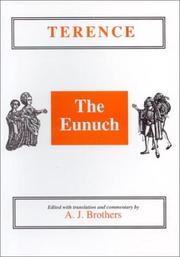| Listing 1 - 10 of 46 | << page >> |
Sort by
|

ISBN: 0856685135 0856685127 9780856685125 Year: 2000 Publisher: Warminster: Aris and Phillips,
Abstract | Keywords | Export | Availability | Bookmark
 Loading...
Loading...Choose an application
- Reference Manager
- EndNote
- RefWorks (Direct export to RefWorks)
Latin drama (Comedy) --- Comédie latine --- History and criticism --- Histoire et critique --- Terence --- Comédie latine
Book
ISBN: 9780620531047 0620531045 Year: 2011 Publisher: Pretoria : Cordis Trust,
Abstract | Keywords | Export | Availability | Bookmark
 Loading...
Loading...Choose an application
- Reference Manager
- EndNote
- RefWorks (Direct export to RefWorks)
Comédie latine. --- Latin drama (Comedy). --- Latin drama (Comedy). --- Plautus, Titus Maccius. --- Plautus, Titus Maccius.
Book
Year: 1991 Publisher: Roma : Bulzoni,
Abstract | Keywords | Export | Availability | Bookmark
 Loading...
Loading...Choose an application
- Reference Manager
- EndNote
- RefWorks (Direct export to RefWorks)
Comédie italienne --- Comédie latine médiévale et moderne --- Pédantisme --- Thèmes, motifs. --- Histoire et critique. --- Dans la littérature.
Book
Year: 1931 Publisher: Berlin : Weidmannsche Buchhandlung,
Abstract | Keywords | Export | Availability | Bookmark
 Loading...
Loading...Choose an application
- Reference Manager
- EndNote
- RefWorks (Direct export to RefWorks)
Book
Year: 1972 Publisher: Leipzig : Zentralantiquariat der deutschen Demokratischen Republik,
Abstract | Keywords | Export | Availability | Bookmark
 Loading...
Loading...Choose an application
- Reference Manager
- EndNote
- RefWorks (Direct export to RefWorks)
Térence (0190?-0159 av. J.-C.) --- Comédie latine médiévale et moderne --- Théâtre scolaire et universitaire --- Influence --- Allemagne --- Allemagne --- Térence (0190?-0159 av. J.-C.) --- Comédie latine médiévale et moderne --- Théâtre scolaire et universitaire --- Influence --- Allemagne --- Histoire --- Allemagne --- Histoire
Book
Year: 1984 Publisher: Urbino : Università degli studi di Urbino,
Abstract | Keywords | Export | Availability | Bookmark
 Loading...
Loading...Choose an application
- Reference Manager
- EndNote
- RefWorks (Direct export to RefWorks)
Book
Year: 1985 Publisher: Urbino : Università degli studi di Urbino,
Abstract | Keywords | Export | Availability | Bookmark
 Loading...
Loading...Choose an application
- Reference Manager
- EndNote
- RefWorks (Direct export to RefWorks)
Book
ISBN: 9781910572382 9781910572375 1910572373 1910572381 Year: 2016 Publisher: Liverpool Liverpool University Press
Abstract | Keywords | Export | Availability | Bookmark
 Loading...
Loading...Choose an application
- Reference Manager
- EndNote
- RefWorks (Direct export to RefWorks)
Euclio, a poor peasant, finds a pot of gold which he is terrified of losing; he hides it in his house. He has a daughter Phaedrium who is (unknown to Euclio) pregnant, having been raped by the young man Lyconides. Lyconides' rich uncle Megadorus plans to marry Phaedrium precisely because she is poor. Euclio reluctantly agrees, but when he finds his house full of people preparing for the wedding feast he takes the gold and tries to find somewhere else to hide it. Lyconides' slave becomes aware of this and manages to steal the gold. Meanwhile Lyconides, who is aware of his obligation to Phaedrium, learns of his uncle's plan and gets his mother to persuade his uncle to abandon it. The moment when he explains the situation to Euclio is just the moment when Eulcio has found out that his gold has been stolen. Lyconides soon finds out that his own slave is the thief. From here on the text is lost. The end of the play is given in the ancient summaries: Lyconides gets his slave to give Euclio back his gold. Euclio, understanding that his obsession with keeping the gold caused him only unhappiness, presents both it and his daughter to Lyconides. Provides the first detailed commentary on the text for over a century; Critically examines the various options that have been proposed for the end of the play, its construction and influence on subsequent classical drama; Provides a detailed and comprehensive background to the writing, performance and transmission of the play in its ancient Roman setting.
Latin drama (Comedy) --- Comédie latine --- Latin drama --- Plautus, Titus Maccius. --- Greek drama (Comedy) --- Comédie latine --- Plautus, Titus Maccius. - Aulularia
Book
ISBN: 9783406641367 3406641369 Year: 2012 Volume: 143 Publisher: München Beck
Abstract | Keywords | Export | Availability | Bookmark
 Loading...
Loading...Choose an application
- Reference Manager
- EndNote
- RefWorks (Direct export to RefWorks)
Latin drama (Comedy) --- Comédie latine --- Plautus, Titus Maccius. --- Plautus, Titus Maccius --- Comédie latine --- Plautus, Titus Maccius - Cistellaria
Multi
ISBN: 9783406608094 3406608094 Year: 2010 Volume: 138 Publisher: München Beck
Abstract | Keywords | Export | Availability | Bookmark
 Loading...
Loading...Choose an application
- Reference Manager
- EndNote
- RefWorks (Direct export to RefWorks)
Latin drama (Comedy) --- Comédie latine --- History and criticism --- Histoire et critique --- Plautus, Titus Maccius. --- Plautus, Titus Maccius --- Comédie latine --- Plautus, Titus Maccius - Asinaria
| Listing 1 - 10 of 46 | << page >> |
Sort by
|

 Search
Search Feedback
Feedback About UniCat
About UniCat  Help
Help News
News